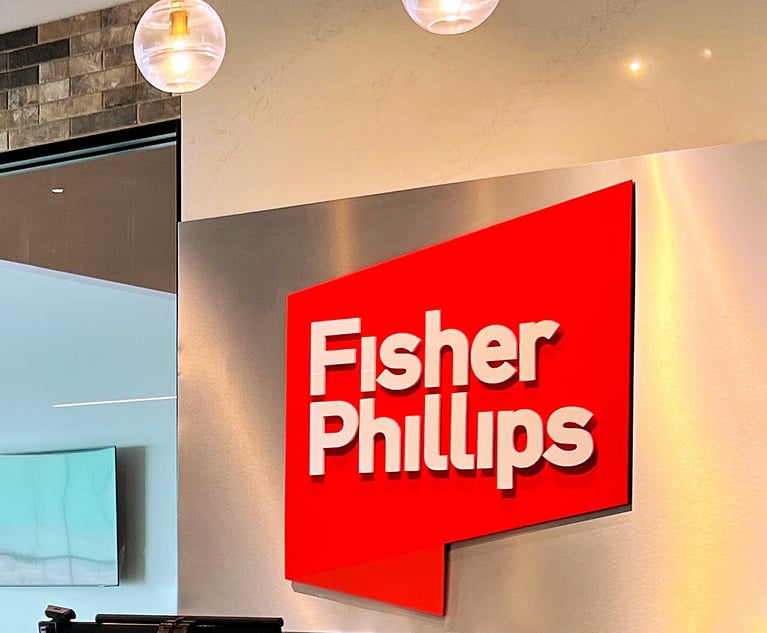 Shari Klevens (left) and Alanna Clair, Dentons. (Courtesy photo)
Shari Klevens (left) and Alanna Clair, Dentons. (Courtesy photo)How Law Firms Can Preserve In-House Privilege
It's one of those calls attorneys hate to get. An angry client complains that the amount billed was too high and that the work performed wasn't…
October 21, 2019 at 10:48 AM
7 minute read
It's one of those calls attorneys hate to get. An angry client complains that the amount billed was too high and that the work performed wasn't worth what was charged. Or, worse, the client calls to complain about the recommended approach to a matter—or suggests that a mistake was made. For many attorneys, calls like these could prompt a call to the firm's in-house counsel or other risk manager. But how to do so in a way that preserves the law firm's privilege?
Earlier this decade, there were several high-profile decisions in states like Georgia and Massachusetts examining the extent to which law firms enjoy the protections of the in-house privilege. The complicating factor, according to courts, was that if a law firm is seeking internal advice about an ongoing client factor, there may be a conflict of interest between the law firm's interests and the client's interests. Indeed, some critics maintained, if a lawyer is seeking legal advice internally while a client representation is ongoing, is it possible that the lawyer is thinking about his or her own interests before the client's? However, most jurisdictions have soundly resolved this issue in favor of law firms to protect their privilege with their in-house general counsel—with some parameters and caveats.
For some law firms, this may involve working with outside counsel when facing a claim or specific legal issue. Other law firms may have dedicated in-house general counsel or a risk management team that represent the firm's legal interests and advise or counsel the firm's attorneys.
This article summarizes some tips for lawyers and firms to help protect and preserve the in-house privilege in working with in-house counsel.
Treat In-House Counsel as Counsel to the Firm in Form and Substance
Although general counsel or the risk manager of a firm is often part of the firm's management or leadership, it is helpful to remember to treat the general counsel or risk manager as counsel to the firm, both in form and in substance. For some firms, this means having a specifically-identified general counsel or deputies. A constant pro hac assignment of GC responsibilities for a revolving door of firm attorneys may cause a third-party to question whether the firm is truly treating their in-house attorney as an attorney to the firm.
Even for firms that do not have a formal general counsel's office, it can be helpful to have a designated person who handles risk management issues to help coordinate the firm's investigation of or attention to a potential claim—and help maintain the privilege.
Ensuring the effectiveness of in-house counsel typically involves the assignment of responsibilities to that counsel, including the investigation and analysis of matters that might involve attorney exposure and generally advising firm attorneys on risk management. In-house counsel's role may also include purchasing legal malpractice insurance, identifying and resolving conflicts of interests, advising attorneys on ethical obligations, reporting potential claims and actual claims, and updating the status of the firm's partnership agreement or corporate structure.
To ensure the legitimacy of the office, many in-house counsel in law firms will act in the same manner as the firm's attorneys do for outside clients. For many firms, this involves using separate billing numbers for general counsel matters and tracking time, among other administrative procedures that confirm the general counsel is dedicated to the firm's interests.
It is not uncommon for a general counsel or risk manager for a firm to appoint deputies to assist with the investigation or overseeing of matters. Most firms will ensure that if a specific client matter is being reviewed, the representative of the firm's in-house counsel will not be an attorney who worked extensively on that matter (or whose work is subject to a potential claim).
Talk to Your GC About Concerns
A law firm's general counsel or risk manager has a host of duties. However, attorneys in law firms can be made aware of who the GC is in their firm so that they can loop in that office in the event of a concern or a potential claim. Involving the in-house counsel or risk manager can help ensure the protection of the privilege between the attorney and law firm, while acting to see that the client's needs are being met if the concern relates to an ongoing representation.
If an attorney is concerned about a specific risk with regard to a client matter but does not discuss it with the in-house counsel, that could create risk for the firm. Indeed, if the attorney talks to other attorneys within the firm about that risk—but does not involve the general counsel or equivalent person—there is a possibility that such communications would not be protected by any in-house privilege. This can be particularly important when an attorney notices a potential claim and has concerns about what to do next.
More often than not, the general counsel can help attorneys—regardless of their seniority—with a gut-check about the proper course of conduct or ethical procedure. It can also be important for insurance coverage purposes for attorneys to talk to their in-house counsel about potential claims or risks. Many insurance policies for law firms require firms to either provide timely notice of a claim (or even those circumstances that could potentially lead to a claim). If an attorney keeps that information to himself or herself and then the risk manager of the firm is unaware of the risk in applying for or renewing insurance, it could put coverage at risk.
In-House Counsel Has Seen It Before
Most law firm general counsel or risk managers have seen it all before. What may seem like an unmanageable crisis to an attorney in the firm may have an easy solution if presented to the general counsel or risk manager. The in-house counsel can also have unique perspective about other issues facing the firm, from ongoing claims and representations to historical claims that can provide unique insight in how to resolve ongoing issues.
For certain issues, the in-house counsel may choose to hire outside counsel to advise the firm or represent it—although many firms are well-equipped to address and resolve many issues with the use of their in-house counsel. An attorney working with their firm's in-house counsel may not only be able to better navigate any complex ethical or risk management issues, but can also take steps to help ensure the protection of the privilege.
Shari L. Klevens is a partner at Dentons in Atlanta and Washington, D.C., and serves on the firm's U.S. board of directors. She represents and advises lawyers and insurers on complex claims and is co-chair of Dentons' global insurance sector team.
Alanna Clair, also a partner at the firm in Washington, focuses on professional liability and insurance defense. Klevens and Clair are co-authors of "The Lawyer's Handbook: Ethics Compliance and Claim Avoidance" and the upcoming 2020 edition of "Georgia Legal Malpractice Law."
This content has been archived. It is available through our partners, LexisNexis® and Bloomberg Law.
To view this content, please continue to their sites.
Not a Lexis Subscriber?
Subscribe Now
Not a Bloomberg Law Subscriber?
Subscribe Now
NOT FOR REPRINT
© 2024 ALM Global, LLC, All Rights Reserved. Request academic re-use from www.copyright.com. All other uses, submit a request to [email protected]. For more information visit Asset & Logo Licensing.
You Might Like
View All
On the Move: Hunton Andrews Kurth Practice Leader Named Charlotte Managing Partner
6 minute read
Husch Blackwell, Foley Among Law Firms Opening Southeast Offices This Year
9 minute read

Trending Stories
- 1Trailblazing Broward Judge Retires; Legacy Includes Bush v. Gore
- 2Federal Judge Named in Lawsuit Over Underage Drinking Party at His California Home
- 3'Almost an Arms Race': California Law Firms Scooped Up Lateral Talent by the Handful in 2024
- 4Pittsburgh Judge Rules Loan Company's Online Arbitration Agreement Unenforceable
- 5As a New Year Dawns, the Value of Florida’s Revised Mediation Laws Comes Into Greater Focus
Who Got The Work
Michael G. Bongiorno, Andrew Scott Dulberg and Elizabeth E. Driscoll from Wilmer Cutler Pickering Hale and Dorr have stepped in to represent Symbotic Inc., an A.I.-enabled technology platform that focuses on increasing supply chain efficiency, and other defendants in a pending shareholder derivative lawsuit. The case, filed Oct. 2 in Massachusetts District Court by the Brown Law Firm on behalf of Stephen Austen, accuses certain officers and directors of misleading investors in regard to Symbotic's potential for margin growth by failing to disclose that the company was not equipped to timely deploy its systems or manage expenses through project delays. The case, assigned to U.S. District Judge Nathaniel M. Gorton, is 1:24-cv-12522, Austen v. Cohen et al.
Who Got The Work
Edmund Polubinski and Marie Killmond of Davis Polk & Wardwell have entered appearances for data platform software development company MongoDB and other defendants in a pending shareholder derivative lawsuit. The action, filed Oct. 7 in New York Southern District Court by the Brown Law Firm, accuses the company's directors and/or officers of falsely expressing confidence in the company’s restructuring of its sales incentive plan and downplaying the severity of decreases in its upfront commitments. The case is 1:24-cv-07594, Roy v. Ittycheria et al.
Who Got The Work
Amy O. Bruchs and Kurt F. Ellison of Michael Best & Friedrich have entered appearances for Epic Systems Corp. in a pending employment discrimination lawsuit. The suit was filed Sept. 7 in Wisconsin Western District Court by Levine Eisberner LLC and Siri & Glimstad on behalf of a project manager who claims that he was wrongfully terminated after applying for a religious exemption to the defendant's COVID-19 vaccine mandate. The case, assigned to U.S. Magistrate Judge Anita Marie Boor, is 3:24-cv-00630, Secker, Nathan v. Epic Systems Corporation.
Who Got The Work
David X. Sullivan, Thomas J. Finn and Gregory A. Hall from McCarter & English have entered appearances for Sunrun Installation Services in a pending civil rights lawsuit. The complaint was filed Sept. 4 in Connecticut District Court by attorney Robert M. Berke on behalf of former employee George Edward Steins, who was arrested and charged with employing an unregistered home improvement salesperson. The complaint alleges that had Sunrun informed the Connecticut Department of Consumer Protection that the plaintiff's employment had ended in 2017 and that he no longer held Sunrun's home improvement contractor license, he would not have been hit with charges, which were dismissed in May 2024. The case, assigned to U.S. District Judge Jeffrey A. Meyer, is 3:24-cv-01423, Steins v. Sunrun, Inc. et al.
Who Got The Work
Greenberg Traurig shareholder Joshua L. Raskin has entered an appearance for boohoo.com UK Ltd. in a pending patent infringement lawsuit. The suit, filed Sept. 3 in Texas Eastern District Court by Rozier Hardt McDonough on behalf of Alto Dynamics, asserts five patents related to an online shopping platform. The case, assigned to U.S. District Judge Rodney Gilstrap, is 2:24-cv-00719, Alto Dynamics, LLC v. boohoo.com UK Limited.
Featured Firms
Law Offices of Gary Martin Hays & Associates, P.C.
(470) 294-1674
Law Offices of Mark E. Salomone
(857) 444-6468
Smith & Hassler
(713) 739-1250






